-ish
(Old English: a suffix meaning, characteristic of, like, tending to; of or relating to, from; somewhat, approximately; or a verb ending)
A suffix used to form adjectives from nouns and from adjectives. It refers to "relation, resemblance, similarity", and sometimes has a diminutive force; such as, "selfish, boyish, brutish; whitish, somewhat white".
A verb ending, originally appearing in certain verbs of French origin; such as, "abolish, cherish, finish, furnish, garnish", and "impoverish".
The decision of the school principal to abolish cheerleaders during football games upset both parents and students.
The teacher abolished all the mathematical equations from the chalkboard when he wiped it clean.
People in Mark's neighborhood tried to abolish the noise made by other people's dogs during the night.
2. To do away with wholly; to annul; to make void; said of laws, customs, institutions, governments, etc., such as to abolish slavery, to abolish illegal drugs: The edict from the mayor's office abolishes the requirement to license pets.Some people are trying to abolish the death penalty.
3. To put an end to, or to destroy; such as, physical objects; to wipe out: In his famous speech, the president abolished the use of the term "freaks" when referring to individuals with abnormalities in circuses and carnivals.4. Used especially in legal circles to indicate the annulment of a law: Compulsory military service in the United States has been abolished, so the services now have volunteers as members.
5. Etymology: borrowed from Middle French aboliss-, stem of abolir, "to abolish, to do away with"; a borrowing from Latin abolere, "to cause to die out, to retard the growth of" from ab- "from" + -adolere, "to grow, to nourish" and is said by some etymological sources to be related to adolescere, "to grow up".
2. To counsel in terms of someone's behavior: The assistant principal of the school admonished the students about their noisy behavior in the library.
3. To advise a person to do or, more often, not to do something: The judge was admonishing both lawyers not to waste anymore court time with petty arguments.
The doctor always admonishes her patients to cut down on excessive meat consumption.
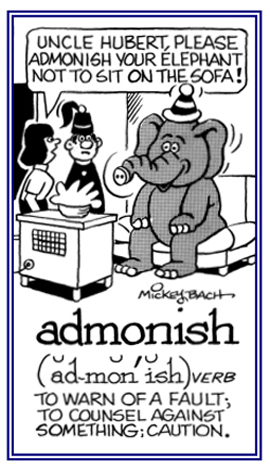
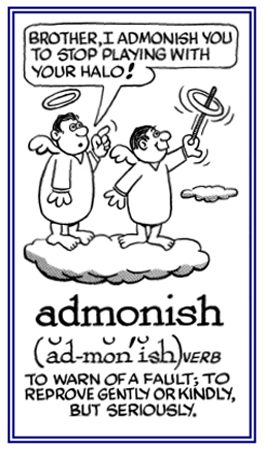
Go to this Word A Day Revisited Index
so you can see more of Mickey Bach's cartoons.
2. Etymology: from Old French anguisse, angoisse, "choking sensation, distress, anxiety, rage"; from Latin angustia, "tight place; tightness, straitness, narrowness"; figuratively "distress, difficulty," from ang(u)ere, "to throttle, to torment, to make narrow".
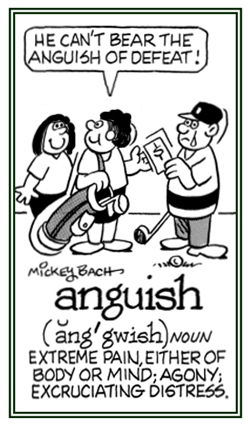
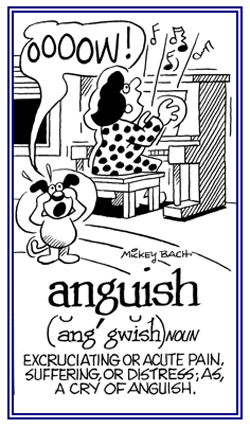
Go to this Word A Day Revisited Index
so you can see more of Mickey Bach's cartoons.
2. To long for something that is being denied; to pine for: After days in the hospital without visitors, Brad could only languish for the sight of his family.
When Tim had to languish in his bed for such a long time because he was ill, he started to experience a sense of anguish that he might not ever be well again.
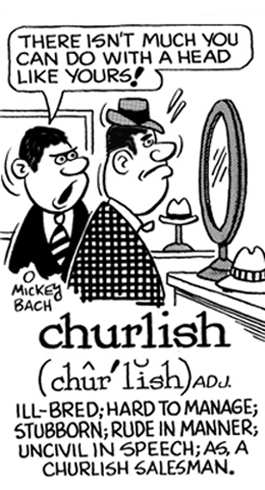
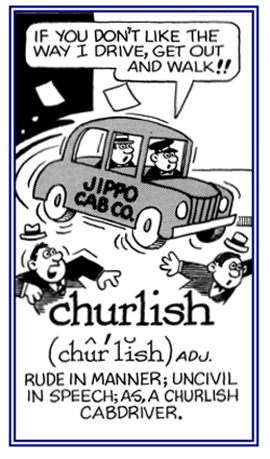
Go to this Word A Day Revisited Index
so you can see more of Mickey Bach's cartoons.
2. Snarling and bad-tempered.
3. Etymology: from about 1175–1225; Middle English curre; apparently shortened from curdogge, "a worthless dog".
2. To lessen the authority or dignity of; to put down; to degrade; to abase; to weaken.
3. To contract a perfect or minor musical interval by one semitone.
4. To take away; to subtract; to decrease, lessen, abate, reduce, contract, curtail, impair, degrade.
5. To appear smaller, or to make something appear smaller.

